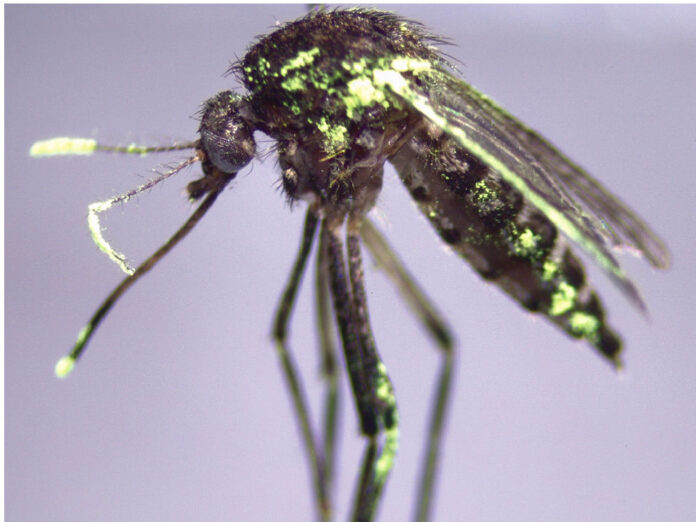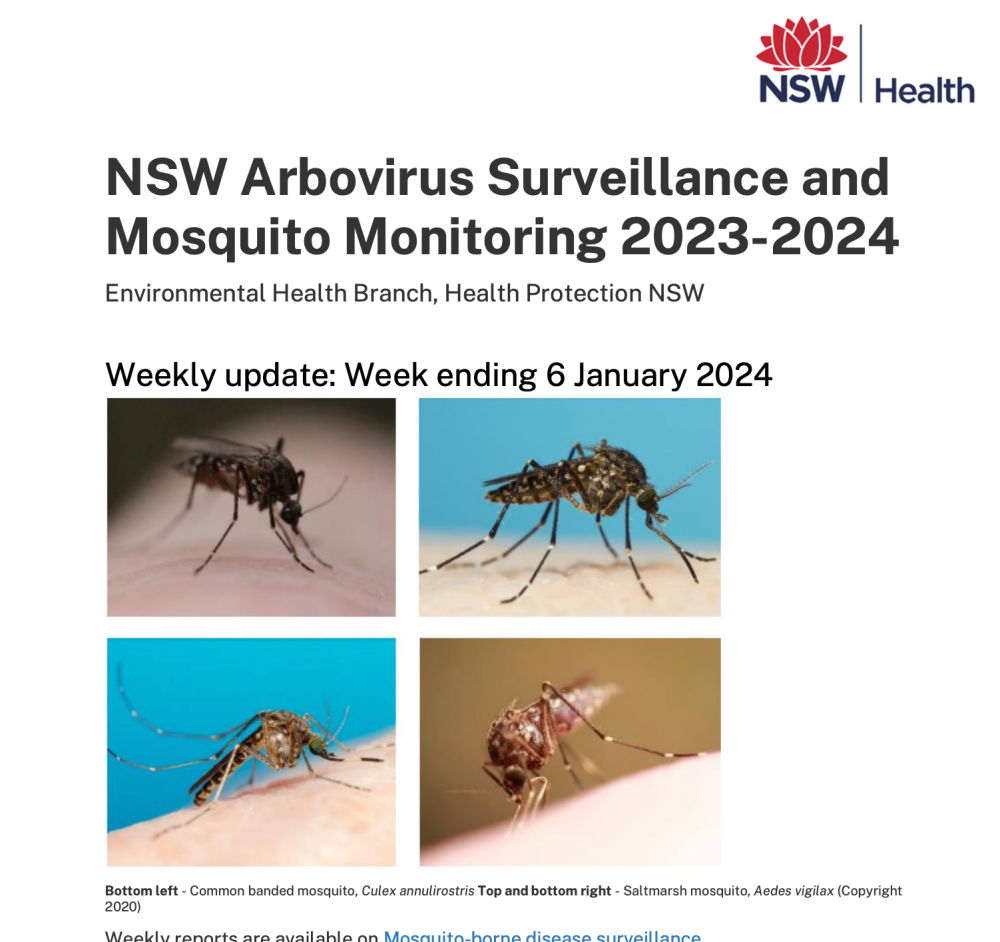Recently, an ITC Lane Cove Chat Member asked if anyone else thought that mosquitoes were in plague proportions in Lane Cove and if Lane Cove Council had a mosquito eradication process in place. Several other members agreed they had been bitten more lately and warned not to go near areas like Stringybark Creek Reserve without applying mozzie repellent.
ITC is like a magnet for mozzies – if they are around, we will be bitten. For that reason, ITC has been an avid follower on Twitter/X of Dr Cameron Webb @mozziebites.
Dr Cameron Webb is a Clinical Associate Professor with the University of Sydney (School of Medical Science & Sydney Infectious Diseases Institute) and Principal Hospital Scientist with the Department of Medical Entomology at NSW Health Pathology, Westmead Hospital. Cameron’s primary focus is understanding the role of environmental management and urban development in reducing the risks of mosquito-borne disease. He has been called on to provide expert advice on various medically essential arthropods, such as mosquitoes, head lice, ticks, mites, biting midges, bed bugs and flies, to local, state, federal and international government agencies.
Fundamental to his research is an understanding of the ecological role of mosquitoes and how wetland conservation, construction and rehabilitation projects may influence regional mosquito-borne disease risk together with changes in the local environment resulting from climate change, potential introductions of exotic mosquito species and personal protection strategies (e.g. insect repellents). With mosquito-borne disease caused by Japanese encephalitis, Murray Valley encephalitis, and Ross River viruses an ongoing concern for authorities around the country, strategic management plans are required to minimise future health risks in the face of climate change and extreme weather events.

ITC contacted Dr Webb and asked him the following questions:
How Long Will the Mozzie Season Be in 2024?
It has been a very unusual mosquito season to date. We were expecting sweltering and dry conditions, but the warm, rainy, and humid conditions have been quite different, and some mosquitoes are increasing.
The recent rainfall, the most substantial for the season in Sydney, means that increasing numbers of mosquitoes should be expected over the next two weeks – unfortunately, just in time for the last period of summer school holidays and Australia Day long weekend.
While it is difficult to predict what’s to come, as the weather seems increasingly unpredictable, we typically expect mosquitoes to be active through to the early weeks of April.
The “mozzie season” can be slightly shorter or much longer depending on rainfall and temperatures. As soon as cooler overnight temperatures arrive, mosquito numbers will decline. But that’s still a couple of months away, at least.
Is Lane Cove more likely to have an issue with mozzies due to being located near the Lane Cove River?
There are dozens of different types of mosquitoes found across Sydney, and in the Lane Cove region, mosquitoes may come from saltwater and freshwater habitats.
There are specific mosquitoes found in wetland, bushland, and backyard environments, too, and the numbers of each depend on the season and rainfall.
While the “saltmarsh” mosquito, Aedes vigilax, is the major pest mosquito along Sydney’s waterways, our studies have suggested that their numbers are lower along the Lane Cove River compared to the Parramatta River or Georges River area.
This is mainly because the mangrove habitats along the Lane Cove River are more likely to be more regularly flushed by tides. A study on mangrove habitats was undertaken in 2016 – you can read it here.
Is Lane Cove more likely to have an issue with mozzies due to the amount of bushland in Lane Cove (according to Lane Cove Council, nearly every home in Lane Cove is located 500 m from bushland)?
Following rainfall, mosquito numbers in bushland areas will increase. Some mosquitoes specialise in temporary puddles and ponds created by rainfall.
Some mosquitoes love the freshwater rock pools found in many bushland areas.
However, the same conditions that prompt an increase in these mosquitoes also will increase the mosquitoes coming out of our backyards!
Should Lane Cove Council Have a Mozzie Eradication Programme?
No. There isn’t strong evidence that the mosquito problems in the local area are any more significant than those across Sydney. The other challenge is that it is unlikely in other regions of Sydney where mosquito control is undertaken, there aren’t specific “hot spots” of mosquito breeding that have been identified and where ecologically sustainable mosquito control products can be used.
What Steps Can Local Councils Undertake to Raise Awareness of the Health Risks Associated with Mosquitoes?
Many councils in NSW have programs to raise awareness of mosquito health risks and promote ways to avoid mosquito bites.
This includes taking measures in your backyard and around the home to reduce opportunities for mosquito breeding. This includes ensuring you tip out, throw away, or cover up any water-holding containers.
Residents can also keep track of mosquito monitoring carried out by NSW Health here.
While Lane Cove Council does not participate in the program, nearby councils such as Northern Beaches, Parramatta, Canada Bay, and Hills District all track local mosquito numbers. They will provide information on when mosquito populations are increasing but, importantly if any elevated risk of mosquito-borne disease is identified.
The risk of the Ross River virus in the Lane Cove area is shallow, but steps should still be taken to avoid mosquito bites.
Dancing mosquito larvae! Wrigglers of Aedes vigilax enjoying the flooded saltmarsh along the Parramatta River. These will emerge as adult mosquitoes by early next week (as will many others in coastal wetlands of NSW and SE QLD) 🦟 pic.twitter.com/HAK0bz4HKC
— Dr Cameron Webb (@Mozziebites) January 17, 2024
Essential Tips from Dr Webb
Dr Webb recently wrote an article in The Conversation where he recommended that parents not use wristbands, patches and stickers to protect their children against mosquito bites. You can read the article here.
If you want to know how to mozzie-proof your home – read our article here.
Dr Webb also recently appeared on ABC TV to talk about the mosquito numbers increasing due to hot and humid weather – you can watch the interview here.
Cover Photo: The “saltmarsh” mosquito, Aedes vigilax, – Source Dr Cameron Webb
Help Support Local and Independent News
You can support us in three ways:
- Become an ITC reader sponsor – If you have enjoyed our local news coverage, please consider becoming an ITC reader sponsor. You can sponsor us with a monthly sponsorship fee. We have reader sponsors who support us for $5.00 a month and some who invest $100 a year – no amount is too small or too big. Thank you so much to those who supported us via our press Patreon account. Help Us Here.
- Buy the ITC team a coffee – We now have a team, and they need to be paid – by the ITC team a coffee (or two) that will help us pay their wages. Buy a Coffee here.
- If you own a Lane Cove Business or a Lane Cove resident who owns a business, you can advertise with ITC. Please email us here for our rates card.














